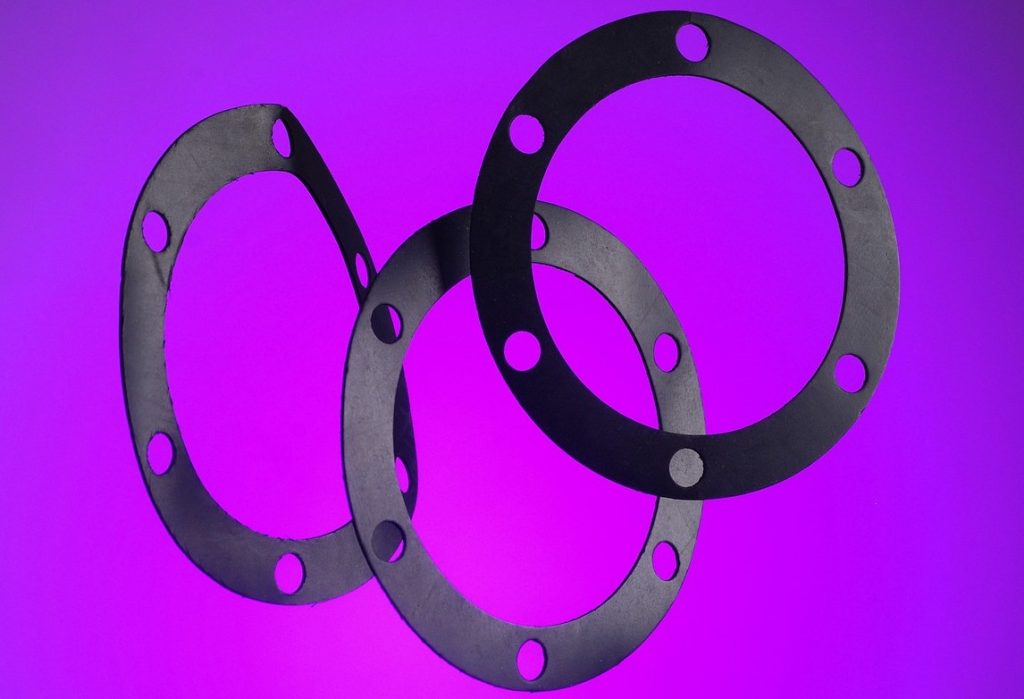
Know the role of gasket material selection in chemical and petrochemical pipelines. Partner with Gasketech to pick the right materials. Call (03) 9690 2577.
Chemical and petrochemical industries rely heavily on the integrity and safety of pipelines to effectively optimise their day-to-day operations. One crucial yet often overlooked component that plays a vital role in ensuring the reliability of their pipelines is the gasket. Gaskets generally act as a seal between pipe flanges, which can help prevent leaks, contain hazardous substances, and maintain operational efficiency.
However, not all gaskets are created equal, especially when it comes to handling the corrosive and harsh conditions of chemical and petrochemical processes.
The Essence of Gasket Material Selection
In the chemical and petrochemical sectors, pipelines transport a wide array of aggressive chemicals, corrosive substances, and volatile fluids. Gaskets must effectively seal joints under high pressure and temperature while resisting the detrimental effects of chemical exposure and mechanical stress. Choosing the appropriate gasket material is crucial to prevent leaks, minimise downtime, and ensure the safety of personnel and the environment.
But selecting the right gasket material for chemical and petrochemical pipelines can be complex due to the diverse range of fluids being transported and the extreme conditions they encounter. Factors such as chemical compatibility, temperature variations, pressure fluctuations, and potential vibrations all play a part in determining the suitability of gasket materials. The challenge lies in identifying materials that can withstand these conditions without degrading significantly or compromising the integrity of a pipeline.
Key Material Options for Pipeline Gaskets
Several gasket materials can be specifically engineered to meet the demands of chemical and petrochemical pipelines. These materials include the following.
• Fluoroelastomers (FKM/Viton): Known for their exceptional chemical resistance, fluoroelastomers are often used for sealing applications that involve aggressive chemicals and high temperatures.
• Expanded PTFE (ePTFE): With its excellent chemical resistance and malleability, ePTFE gaskets can conform to uneven surfaces, which ensures effective sealing in challenging pipeline environments.
• Graphite: Graphite gaskets excel in high-temperature and high-pressure applications. They provide reliable sealing and can handle thermal cycling without losing their integrity.
• Spiral Wound: Comprising a combination of metal and filler materials, spiral wound gaskets offer versatility and resilience against extreme conditions, which makes them suitable for chemical and petrochemical pipelines.
Benefits of Proper Gasket Material Selection
Tons of benefits can be obtained when selecting gasket materials properly.
First, it can enhance the safety of chemical and petrochemical pipelines. The right gasket materials can ensure leak-free connections, preventing hazardous substances from escaping and minimising the risk of accidents. Proper gasket material selection can also ensure operational reliability. This process reduces the likelihood of unplanned downtime due to leaks, which contributes to the consistent operation of chemical and petrochemical processes.
Ultimately, investing in high-quality gasket materials that can withstand the harsh conditions of chemical and petrochemical pipelines can lead to long-term cost savings as they can minimise maintenance and replacement needs.
Gasket material selection is a critical factor in ensuring the integrity, safety, and performance of chemical and petrochemical pipelines. With the wide variety of materials available, understanding the specific demands of the application is essential for making informed decisions. By choosing gasket materials that are compatible with the transported fluids, industries can benefit from efficient, reliable, and safe pipeline operations in chemical and petrochemical facilities for a long time.

Maintain equipment integrity with Viton gaskets from Gasketech for your preventive maintenance. Achieve resistance to elements. Call us at (03) 9690 2577.
Preventive maintenance is a significant aspect of ensuring the long-term reliability and performance of industrial equipment. Among the essential components during this type of maintenance are Viton gaskets. These gaskets are generally known for their exceptional sealing properties and compatibility with a variety of operating conditions. They can be maximised to maintain equipment integrity, prevent leaks, and extend the lifespan of critical machinery and systems in a wide range of industries.
Characteristics of Viton Gaskets
Viton gaskets are high-performance sealing components made from Viton fluoroelastomer material. Some notable characteristics of these gaskets are as follows.
• Chemical Resistance: Viton gaskets are highly resistant to a wide range of chemicals, including oils, fuels, acids, and solvents. This specific quality makes these gaskets suitable for applications where exposure to aggressive fluids is common.
• Temperature Resistance: Additionally, Viton gaskets can withstand a broad temperature range, from extremely low temperatures to high temperatures up to 200-250°C, depending on the specific grade. This temperature resistance allows them to be suitable for use in both extreme cold and hot environments.
• Compression Set Resistance: Viton gaskets can retain their shape and sealing performance over extended periods, even under compression. Their excellent compression set resistance allows them to bounce back to their original shape after being compressed.
• Aging and Weather Resistance: Viton gaskets exhibit exceptional resistance to aging and weathering, making them suitable for outdoor and long-term applications where exposure to sunlight, ozone, and environmental elements can occur.
• Flexible and Elastomeric: Viton gaskets are flexible and elastomeric, allowing them to conform to irregular surfaces and create a reliable seal.
Viton Gaskets Major Advantages
When maintaining equipment integrity, Viton gaskets can be maximised as they offer tons of advantages. One of the advantages of using Viton gaskets is enhanced sealing reliability. These gaskets can form a tight and durable seal between mating surfaces, making them effective in containing fluids, gases, and chemicals within the system. Their enhanced sealing reliability allows equipment pieces to operate without leakages or loss of performance.
Viton gaskets can also prevent downtime and costly repairs. Their resistance to chemicals, temperatures, compression set, aging, and weather elements allows the gaskets to be reliable in maintaining equipment integrity in demanding environments. This quality then leads to reduced downtimes and unscheduled shutdowns as well as boosted overall productivity.
Even the lifespan of equipment pieces can be extended once Viton gaskets are installed. By providing a reliable barrier against leaks and fluid seepage, these gaskets can protect critical components from corrosion and damage, reducing the need for premature replacements and contributing to overall cost savings for the operation.
Viton gaskets are an essential element of preventive maintenance, contributing to equipment integrity, sealing reliability, and extended equipment lifespan. Their ability to withstand challenging operating conditions, prevent leaks, and minimise downtime makes these gaskets a preferred choice for critical applications in various industries.
By investing in these high-performance gaskets in preventive maintenance plans, you can easily enhance the reliability and efficiency of your equipment, reduce operational costs, and ensure the smooth and uninterrupted operation of industrial systems.